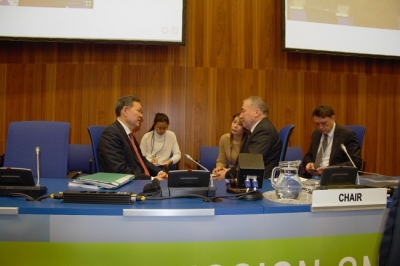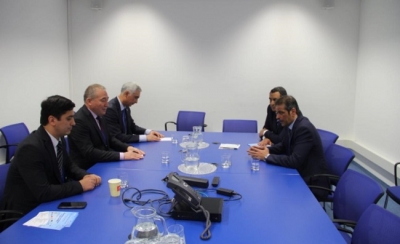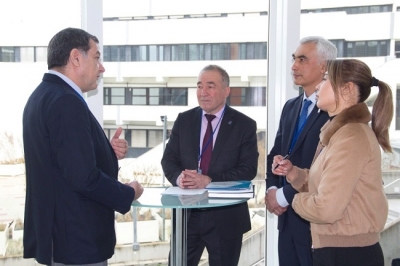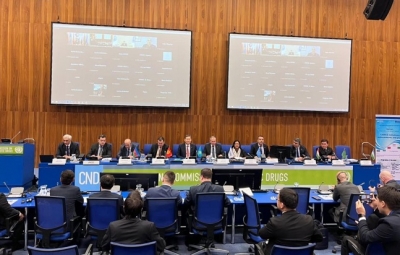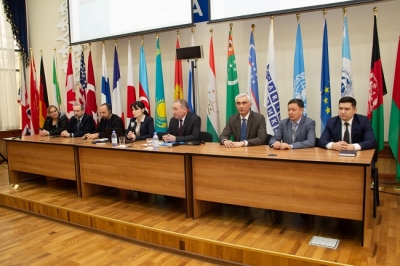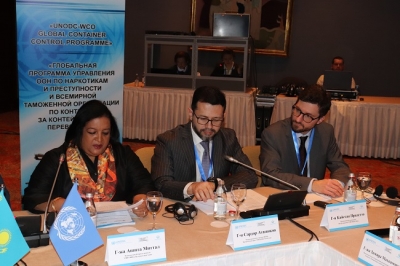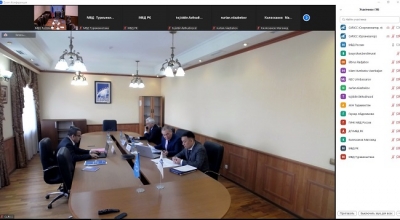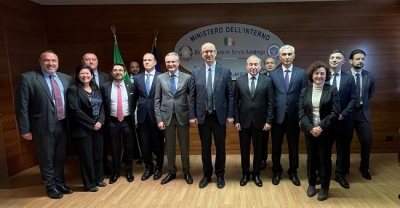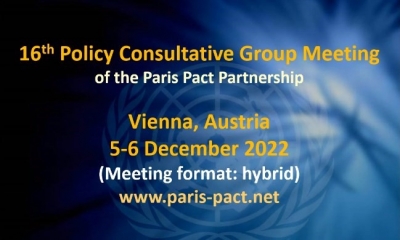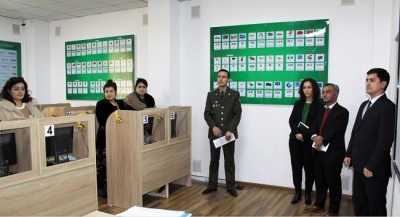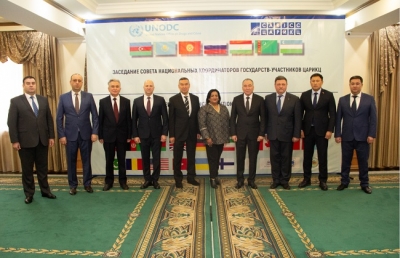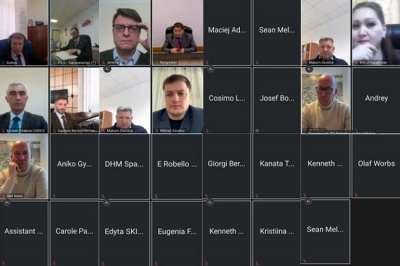Breaking news (528)
On holding a meeting of the Director of CARICC with the First Deputy Minister of Foreign Affairs of the Republic of Kazakhstan, Mr. Kairat Umarov
On March 14, 2023, following the results of the side event held by CARICC, a meeting was held with Director Yazlyev A.O. with the First Deputy Minister of Foreign Affairs of the Republic of Kazakhstan, Mr. Kairat Umarov.
During the meeting, issues of cooperation in the field of combating drug trafficking, as well as a number of other issues related to the activities of CARICC were discussed.
Information was provided on the measures taken to address the issues of financing CARICC by donor countries, including measures that provide for assistance by the Center in conducting special anti-drug operations, including controlled deliveries.
Mr. K. Umarov confirmed his interest in further development and strengthening of cooperation with CARICC, and also expressed Kazakhstan's support in considering
issues of ensuring its uninterrupted functioning.
At the same time, the Director of CARICC expressed gratitude to the Kazakh side for the support provided to the activities of the Center, including financial ones, and also expressed hope for further support in resolving issues of developing the activities of the Organization.
On the meeting of the CARICC delegation with the leadership of the Criminal Information Center to Combat Drugs (GCC-CIC)
On March 13, 2023, on the sidelines of the 66th session of the Commission on Narcotic Drugs, held from March 13 to 17 in Vienna, a meeting of the CARICC delegation headed by Director Yazlyev A.O. with the Director of the Gulf Cooperation Council Criminal Information Center to Combat Drugs (GCC-CIC), Mr. Eisa Saeed Al Kuwari.
The parties presented information on the current activities of the two centers in the regions of the Arab States of the Gulf and Central Asia, and also discussed the drug situation in the member countries of their organizations.
During the meeting, the parties discussed the practical aspects of bilateral cooperation against the backdrop of a rapidly changing drug situation and an increase in seizures of hard drugs in their regions.
On holding a meeting of the CARICC delegation with the representative of the UNODC in Vienna, Mr. Tofig Murshudlu
On March 13, 2023, on the sidelines of the 66th session of the Commission on Narcotic Drugs, held from March 13 to 17 in Vienna, a meeting of the CARICC delegation headed by Director Yazlyev A.O. with the UNODC Representative in Vienna, Mr. Tofig Murshudlu.
During the meeting, the parties exchanged views on the state and prospects of international cooperation, discussed issues of joint cooperation within the framework of anti-drug projects implemented under the auspices of the UN, as well as the provision of financial and technical assistance to CARICC.
Along with this, Mr. T.Murshudlu emphasized the importance of CARICC as a regional anti-drug organization that has achieved positive results in practical activities that are important for the participating states and the region as a whole.
Mr. A. Yazlyev expressed gratitude to the UNODC representative for the support provided by CARICC and expressed readiness to intensify cooperation in the implementation of joint anti-drug projects.
CARIСC SIDE EVENT WITHIN THE 66TH SESSION OF UN COMMISSION ON NARCOTIC DRUGS
In the period from March 13 to March 17, 2023 in Vienna, the CARICC delegation headed by Director Yazlyev A.O. takes part in the 66th session of the UN Commission on Narcotic Drugs.
Along with this, on March 14, 2023, on the sidelines of the 66th session of the CND, CARICC, together with its participating States and the UNODC Regional Office for Central Asia, organized and held a hybrid side event on the theme “CARICC Initiatives, achievements and plans”.
The event was attended by the heads of the competent authorities and foreign ministries of the CARICC member states, the UNODC Regional Representative for Central Asia Ms. Ashita Mitall, representatives of the permanent missions to the international organizations in Vienna, observer states to CARICC, international organizations, as well as donor-countries and partners.
Advisor/Head of the Information and Analytical Division of CARICC, Mr. Azizbek Erkaboev was the moderator of side event.
CARICC Director Yazlyev A.O. opened the event. In his speech, he emphasized that the Center continues to be an organization that fulfills the tasks assigned to it in combating transnational organized drug crime.
Further, the First Deputy Minister of Foreign Affairs of the Republic of Kazakhstan, Mr. Kairat Umarov, delivered a welcoming speech. In his speech, he emphasized the importance of CARICC as a regional anti-drug organization, and against the background of the growth of drug production in Afghanistan and the increase in large-scale smuggling of opiates and methamphetamine to the countries of the region, it is able to withstand challenges and threats in the fight against transnational drug crime.
In a welcoming speech by the UNODC Regional Representative for Central Asia Ms. A. Mitall, the importance of mutual practical cooperation in the fight against organized crime, as well as the need for financial support for the CARICC project from participating States and donor countries.
In addition, the heads of the competent authorities of Azerbaijan, Kyrgyzstan, Tajikistan, Turkmenistan and Uzbekistan delivered a welcoming speech, where they noted the role of the Center in the fight against transnational drug crime and its capabilities in the Central Asian region.
In the main session of the side event, a video with brief information about the activities of CARICC and a presentation on initiatives, achievements and plans of CARICC were shown.
In addition, law enforcement officials and international organizations and partners of the Center took part in the event online. More than 100 people took part in the side event.
On the sidelines of the CND session, it is planned to hold a number of bilateral and multilateral meetings with representatives of interested departments of the CARICC member states, international and regional organizations.
Conducting a national training course for law enforcement officers of Turkmenistan
As part of the UNODC initiative to strengthen regional cross-border cooperation by strengthening the capacity of Border Liaison Offices (BLOs) in Central Asia of Sub-program 1 of the UNODC Program for Central Asia for 2022-2025, from February 27 to March 3, 2023 in Almaty, on the basis of CARICC, a national training course was held on the use of the IBM "i2" software and the use of the BLOs database, as well as new psychoactive substances (NPS) for law enforcement officers of Turkmenistan.
This training course helped improve the skills of law enforcement officials in identifying organized criminal groups involved in the production and distribution of synthetic drugs, as well as strengthening international cooperation in this area.
Employees of CARICC and the Central Anti-Drug Administration of the Ministry of Internal Affairs of Italy acted as experts.
According to the participants, the training course corresponded to the functional duties of the trainees and turned out to be useful in the daily service and military activities of law enforcement officers.
The participants of the training highly appreciated the organization of the event and the way the training material was presented.
Image Gallery
-
 Click to open image!
Click to open image!
Click to open image!
Click to open image!
-
 Click to open image!
Click to open image!
Click to open image!
Click to open image!
-
 Click to open image!
Click to open image!
Click to open image!
Click to open image!
-
 Click to open image!
Click to open image!
Click to open image!
Click to open image!
-
 Click to open image!
Click to open image!
Click to open image!
Click to open image!
https://caricc.org/index.php/en/news?start=180#sigProIda84201bbd6
About participation of CARICC in the interregional meeting of experts within the framework of the Interregional Network of Customs Services and Port Control Groups
On February 22–23, 2023, the fifth interregional meeting was held in Almaty in the framework of the Global Container Control Program of the UN Office on Drugs and Crime and the World Customs Organization.
The heads and experts of customs services, as well as other competent agencies of Azerbaijan, Georgia, Kazakhstan, Kyrgyzstan, Pakistan, Tajikistan, Turkmenistan and Uzbekistan attended this event.
Opening the event, Chairman of the State Revenue Committee of the Ministry of Finance of the Republic of Kazakhstan Mr D.Zhanalinov noted that this meeting is a convenient platform for discussing topical issues in the customs sphere and contributes to the development of interregional cooperation.
Ms. Ashita Mittal, UNODC Regional Representative for Central Asia, welcomed the participants.
During the two-day meeting, the participants discussed the results of the interregional operation to curb illicit trafficking in tobacco products, shared successes, difficulties and lessons learned in the coordination of the operation. Further, the issue of multilateral and bilateral practical cooperation within the framework of the IREN Network was discussed, including progress, priorities and proposals for further consolidating success.
During the meeting, the tendencies of the development of the drug situation in the region, the measures taken to prevent the use of legal international trade and transit corridors for the purposes of drug smuggling were considered. In this area, CARICC staff made presentations on "CARICC as a leading platform for promoting and coordinating joint anti-drug operations" and "CARICC's achievements, potential and experience in the information and analytical direction of activity." The representative of CARICC emphasized the importance of analytical work aimed at solving the problems of operational and strategic response to drug trafficking and combating transnational organized crime.
The participants emphasized the need to strengthen cooperation mechanisms and prompt exchange of information, establish and expand ties, timely resolve problematic issues of practical interaction between national contact persons of customs services and port control groups of the countries participating in the Interregional Network and the opportunity to exchange information.
At the end of the event based on the results of the Interregional Expert Meeting, relevant recommendations developed.
Image Gallery
-
 Click to open image!
Click to open image!
Click to open image!
Click to open image!
-
 Click to open image!
Click to open image!
Click to open image!
Click to open image!
-
 Click to open image!
Click to open image!
Click to open image!
Click to open image!
-
 Click to open image!
Click to open image!
Click to open image!
Click to open image!
-
 Click to open image!
Click to open image!
Click to open image!
Click to open image!
-
 Click to open image!
Click to open image!
Click to open image!
Click to open image!
https://caricc.org/index.php/en/news?start=180#sigProIdd28a59d5b9
About an extraordinary meeting of the Council of National coordinators of CARICC member states
On January 31, 2023, an extraordinary meeting of the Council of National Coordinators (CNC) of the participating States of the Central Asian Regional Information Coordination Center for Combating Illicit Trafficking in Narcotic Drugs, Psychotropic Substances and Their Precursors (CARICC/Center) was held online.
Delegations of CARICC member states, UNODC International Program Coordinator Mr. Yusuf Kurbonov, as well as the Director and staff of the Center attended the event.
The meeting was chaired by the Head of the Department for Combating Drug Crime of the Ministry of Internal Affairs of the Republic of Kazakhstan Mr. Kh.Imazhanov.
At the meeting, the Director of the Center A. Yazlyev provided information on the current financial situation in CARICC. Y. Kurbonov also reported on the measures taken to ensure the financial stability of CARICC as a UNODC project.
The meeting participants discussed current and future issues of financing the activities of the Center, following which the relevant decisions were made.
Image Gallery
https://caricc.org/index.php/en/news?start=180#sigProIde65eda87bb
About the meeting at the DCSA of the Ministry of Internal Affairs of Italy
In accordance with the invitation of the Italian side, on January 12, 2023, a meeting of the CARICC delegation headed by Director Atageldy Yazlyev with the delegation of the Central Directorate for Combating Drugs of the Ministry of Internal Affairs of Italy headed by Director Antonio Maggiore took place in Rome.
During the meeting, delegations discussed current and future issues of cooperation in the fight against illicit drug trafficking, including through the organization of international operations using the controlled drug delivery method.
The parties exchanged views on the possibility of organizing joint anti-drug operations, exchanging information on the drug situation and experience in the field of combating drug trafficking and information and analytical direction.
The director of the DCSA of the Italian Ministry of Internal Affairs, A.Maggiore, presented information on the structure, functions and tasks of the Italian police. He reported on the implemented joint operations and expressed hope for the intensification of cooperation with the countries of the Central Asian region.
Further, on January 13, a meeting was held with the heads of the structural divisions of the CUBN, during which issues of bilateral cooperation were discussed.
The DCSA experts provided information on the Italian legislation in the field of investigative activities in the framework of organizing international anti-drug operations using the controlled delivery method.
The analysts highlighted information on the development of the drug situation in Italy and some indicators in the field of combating drug trafficking in this country.
Italian specialists informed about the trainings, including for foreign partners in online and offline formats. A presentation was made on the activities of the department at the CUBN DrugOnline to prevent the spread of drugs using the Internet.
At the end of the meeting, an agreement was reached on building up cooperation between CARICC and the CUBN of the Ministry of Internal Affairs of Italy in the above areas of joint activities.
Image Gallery
https://caricc.org/index.php/en/news?start=180#sigProId421071908c
More...
On the participation of CARICC in the 16th Policy Consultative Group meeting of the Paris Pact Partnership
On December 5-6 2022, CARICC representatives took part online in the 16th Policy Consultative Group meeting of the Paris Pact Partnership, which was held in Vienna, Austria.
The meeting brought together more than 70 participants from 31 countries and 14 international and regional organizations, including delegates who attended in person.
During the meeting, an exchange of views took place on topical issues in the fight against illicit trafficking in Afghan opiates, practical experience and methods for combating international drug trafficking, issues of better coordination of law enforcement agencies, as well as international and regional organizations in the field of drug control were discussed.
In addition, the meeting discussed issues on further research directions in relation to financial flows associated with the illicit production and trafficking of opiates of Afghan origin. At the same time, the regional programs of the UN Office on Drugs and Crime for Afghanistan were considered and issues of countering the drug threat were discussed, taking into account the current situation in Afghanistan.
As a result of the meeting, a number of priority recommendations were identified for implementation by partners in the Paris Pact. Participants stressed the importance of the Paris Pact Initiative for effective cooperation at the regional, interregional and global levels in view of the deteriorating security situation in Afghanistan.
Conducting a training session on the use of a specialized analytical software product
Within the framework of the national initiative of UNODC in Tajikistan "Strengthening control along the Tajik-Afghan border" of the UNODC Program for the States of Central Asia for 2022-2025. in the period from November 28 to December 02, 2022 in Dushanbe, CARICC employees together with the BTRT at the training center of the Border Troops of the Republic of Tajikistan conducted a training course for employees of analytical units of the Border Troops of the Republic of Tajikistan on the use of specialized software "i2 iBase", "i2 Analyst Notebook" in practical work, as well as others necessary programs.
This training course promoted the study of analytical tools such as MS Excel, ArcGIS and I2, which can reduce the processing time of information.
According to the participants, the training corresponded to the functional duties of the trainees and turned out to be useful in the daily service and military activities of the employees of the above departments.
The participants of the training noted the high level of preparation of the event and the instructors, as well as an interesting and easy way of presenting the training material.
The results of the meeting of the Council of National Coordinators CARICC member states
On December 1, 2022, in Almaty, a regular meeting of the Council of National Coordinators (CNC) of the CARICC member states was held in a hybrid format.
The event was attended by members of the CNC and their delegated representatives, UNODC Regional Representative for Central Asia Ms. Ashita Mittal, UNODC International Coordinator Mr. Yusuf Kurbonov, as well as heads of CARICC departments.
The meeting participants discussed the emerging drug situation in the CARICC region and exchanged views on the necessary measures to stabilize it.
The parties took note of the information on the implementation of the CARICC Development Strategy for 2018-2022. In order to continue this work, the Center was instructed to create a Working Group from among the heads of its divisions, representatives of UNODC and the competent authorities of the CARICC member states to develop a draft CARICC Development Strategy for 2023-2027, followed by sending the project document for consideration and approval to the member states CARICC.
The parties took note of the Center's information on the current state and prospects for its development in the coming period.
In addition, within the framework of the meeting of the СNC, the Kazakh side organized and held an international briefing on countering drug addiction and drug trafficking in a hybrid format.
The heads and staff of the competent authorities of the CARICC member states, authorized representatives and liaison officers at the Center, as well as representatives of the Republic of Belarus, the US Embassy and DEA in Kazakhstan, the CSTO, the OSCE and the SCO attended this event.
Image Gallery
-
 Click to open image!
Click to open image!
Click to open image!
Click to open image!
-
 Click to open image!
Click to open image!
Click to open image!
Click to open image!
-
 Click to open image!
Click to open image!
Click to open image!
Click to open image!
-
 Click to open image!
Click to open image!
Click to open image!
Click to open image!
https://caricc.org/index.php/en/news?start=180#sigProIdf4095673f6
About participation of CARICC in the next meeting of the Mini-Dublin Group
On November 30, 2022, representatives of CARICC took part online in the regular meeting of the Mini-Dublin Group, organized by the Embassies of Italy to the Republic of Kazakhstan and the Republic of Uzbekistan.
The representatives of the Ministries of Internal Affairs of Kazakhstan and Kyrgyzstan, as well as representatives of diplomatic, consular and international organizations accredited in the Republic of Kazakhstan and the Kyrgyz Republic attended this meeting.
The Adviser/Head of the Information and Analytical Division of CARICC,
Mr. Azizbek Erkaboev made a welcoming speech, where he informed the meeting participants about the role of the Center in combating international drug trafficking, the current trend in the development of the drug situation in its participating States, and also expressed interest in strengthening cooperation in the fight against drug trafficking.
During the event, the participants presented reviews of the current drug situation in Kazakhstan and Kyrgyzstan, discussed issues of bilateral and multilateral cooperation in the field of combating illicit trafficking in narcotic drugs, psychotropic substances and precursors in Kazakhstan and Kyrgyzstan, and also noted priorities and recommendations for further interaction within the framework of the Mini-Dublin group.

